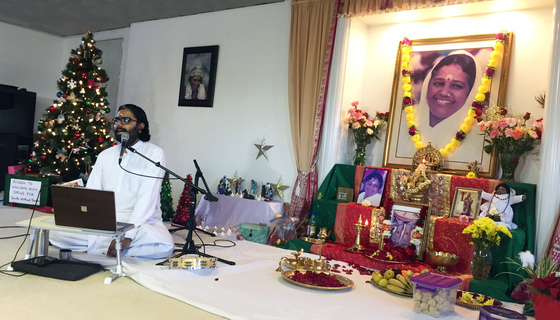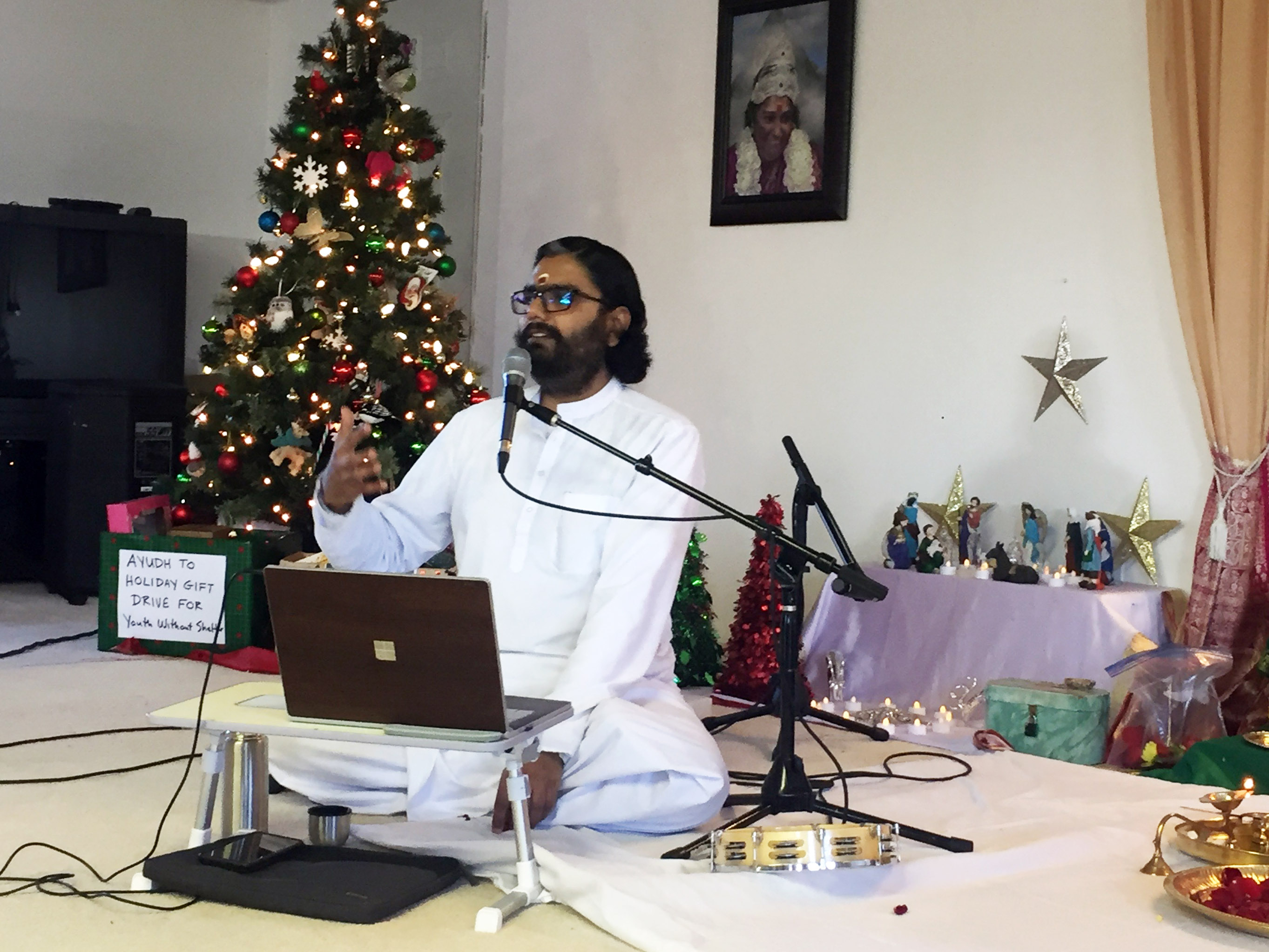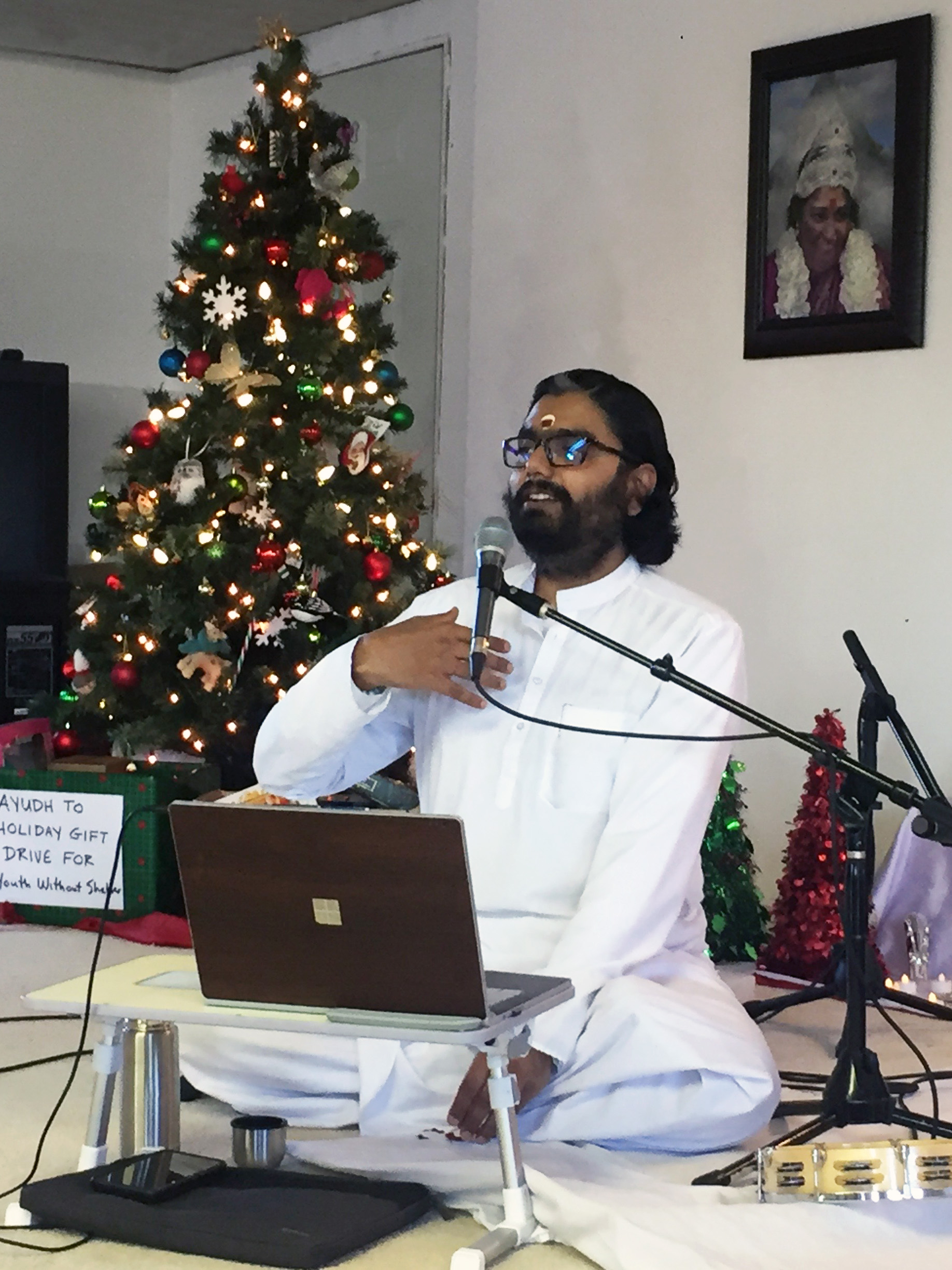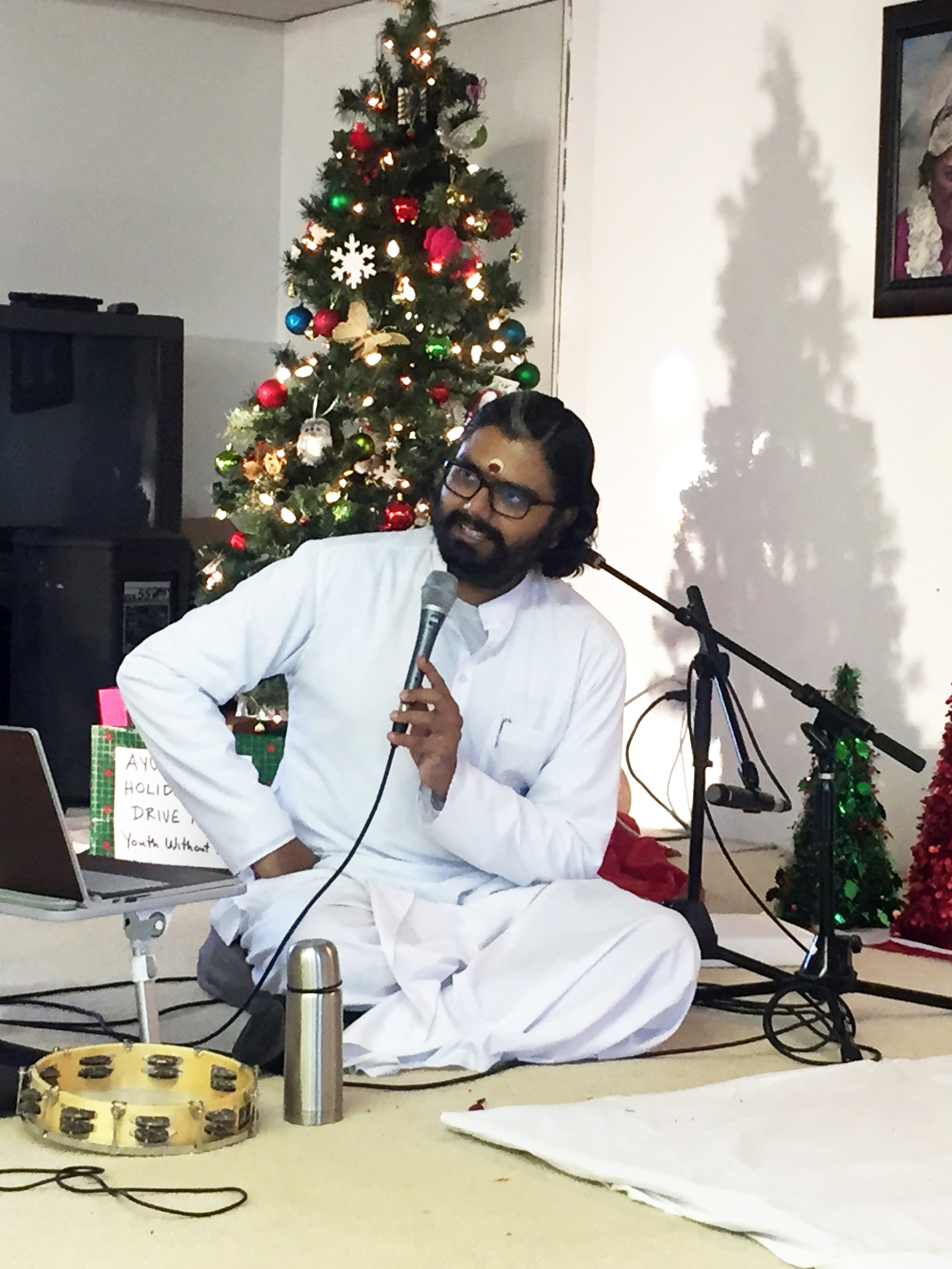Dec 29: New Year's Satsang with Br. Ramanand

Changing our attitude is what makes the New Year fresh

On Saturday, December 29, Amma's Toronto Satsang enjoyed a special satsang with Br. Ramanand, just before the start of a New Year - 2019. In his discourse, Ramanandji asked the devotees: What is it that makes the New Year new? It is true that we start a new calendar year, but ultimately, the calendar is purely a human invention that helps us keep track of time. The thing that really changes on New Year's Eve is our mindset: we contemplate on the year gone by, and on what we want to accomplish in the coming year. We ask ourselves: What have I done this past year? How did I do it? Why did I do it? What should I do from here on in? The start of the New Year is thus a time of reflection and renewal.
Ramanandji quoted a verse from the Bible, 2 Corinthians 4:16, that says: "Therefore, we do not lose heart: though our outer man is decaying yet our inner man is renewed day by day." The 'outer man' or physical body ages and decays over time, but the 'inner man' - the mind - is always being renewed. We thus try, at the start of the New Year, to renew or affirm good qualities in our lives. New Year’s rituals around the world symbolize this: In Japan, they eat noodles symbolizing longevity. In Spain, they eat twelve grapes symbolizing twelve sweet months in the coming year. In Switzerland, they fill their mouths to overflowing with whipped cream, symbolizing abundance of goodness. In Kerala, India, on New Year's Day (Vishu), the first things that everyone sees are the auspicious items arranged on the Vishu Kanni, such as money (Wealth), flowers (Beauty), fruits (Abundance), an image of God (Divinity) and a mirror (Self-reflection). These are the good things that we want to keep prominent in our lives all throughout the year.

In the Gregorian calendar, New Year's Day falls in the month of January, which is named after the Roman god, Janus. Janus is the god of beginnings and endings, passages, and transitions. He is depicted as having two faces: one looking forward to the future, and one looking backward to the past. Amma says: 'The past is a cancelled cheque', meaning there is no use in looking back and lamenting the past. Nonetheless, we can learn from the past, and use it to guide our steps in the present. It is like using the rear-view mirrors while driving a car: if we drive along, ignoring what is behind us, we may get rear-ended. If, on the other hand, we drive forwards looking exclusively in the rear-view mirrors, we will almost certainly hit a car or object in front of us. To drive safely, we must look ahead and move forward, while also integrating information on what lies behind us. This balance between moving forward and looking backward is represented in the two-faced form of Janus.
When we wish each other ‘Happy New Year’, we don’t expect that everything that will happen in coming year will be happy. We will certainly have good and bad experiences this year. Nonetheless, the decision to be happy in the midst of these circumstances lies with us. Amma says that if we decide we want to be happy, nothing can make us sad. Likewise, if we decide we want to be sad, nothing can make us happy. Our happiness or unhappiness, success or lack of achievement, depends on our own minds. Take Amma’s life as an example: She faced so many barriers being born a woman in a poor fishing village in India - financial barriers, geographical barriers, gender barriers. Amma is a fifth grade drop-out and speaks only her mother tongue, Malayalam, so she also faced educational and language barriers. Nevertheless, She has become the head of an international charity, a speciality hospital, and a university. Amma is a also source of solace, joy and inspiration to millions of people. Through the example of Her life, Amma tells us: Turn the obstacles in your life into stepping stones. Turn your successes into inspiration for future action.
 Br. Ramanand quoted the Bhagavad Gita, Chapter 5 Verse 22: "Ye hi samsparsa-ja bhoga/ Duhkha-yonaya eva te/ Adi-antavantah Kaunteya/ Na tesu ramate budhah." Lord Krishna explains: "All the things that we experience through our senses are the very sources of misery. Everything has a beginning and an end. The wise person understands this, and does not take delight in fleeting objects of the senses." Sensory objects cause us misery because they will either break, decay or get lost over time. We should not expect these objects, and the happiness we get from them, to last forever. We should remember that they come and go, and only God remains ever Unchanging. Only by holding on to this knowledge, can we remain happy in the transitory world. The word NEW can be an acronym for 'Never Ending Worries' or 'Never Ever Worry'. When we try to cling to ephemeral objects, we will have 'Never Ending Worries'. When we choose to hold on to God or Guru, then we will 'Never Ever Worry'. Both options are available. The choice is ours.
Br. Ramanand quoted the Bhagavad Gita, Chapter 5 Verse 22: "Ye hi samsparsa-ja bhoga/ Duhkha-yonaya eva te/ Adi-antavantah Kaunteya/ Na tesu ramate budhah." Lord Krishna explains: "All the things that we experience through our senses are the very sources of misery. Everything has a beginning and an end. The wise person understands this, and does not take delight in fleeting objects of the senses." Sensory objects cause us misery because they will either break, decay or get lost over time. We should not expect these objects, and the happiness we get from them, to last forever. We should remember that they come and go, and only God remains ever Unchanging. Only by holding on to this knowledge, can we remain happy in the transitory world. The word NEW can be an acronym for 'Never Ending Worries' or 'Never Ever Worry'. When we try to cling to ephemeral objects, we will have 'Never Ending Worries'. When we choose to hold on to God or Guru, then we will 'Never Ever Worry'. Both options are available. The choice is ours.
In Her New Year's message for 2019, Amma says: "There are two different ways we can celebrate. We can do what most people do and celebrate the holidays marked on the calendar, setting off firecrackers, dancing, singing and fulfilling certain desires. Or we can celebrate by recognizing God’s greatness and beauty in each moment of our life.” May we meet this New Year with a balanced perspective in the midst of positive and negative experiences. May we learn from our mistakes and build on our successes. May we find ways to grow in love and service. May we see God in each moment of our lives.
Om Lokah Samastah Sukhino Bhavantu ~ May All Beings Everywhere Be Happy

